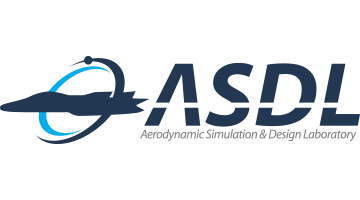ASDL 연구팀, Journal of Computational Physics 학술지 논문 게재
ASDL 연구팀에서 Journal of Computational Physics 학술지에 투고한 논문이 2024년 7월자로 게재되었습니다. 축하합니다!
Title: Shock-capturing PID controller for high-order methods with data-driven gain optimization
Author: Juhyun Kim, Hojun You and Chongam Kim
Journal: Journal of Computational Physics
DOI: https://doi.org/10.1016/j.jcp.2024.113015
Abstract:
We present a novel shock-capturing strategy for high-order methods including discontinuous Galerkin (DG) method with data-driven gain optimization. Inspired by the classical control theory, we utilize a proportional–integral–derivative (PID) controller for capturing shock waves with monotonic subcell distributions. The proposed closed-loop control system for shock-capturing, named shock-capturing PID controller (SPID), consists of two key elements: error estimation based on the multi-dimensional limiting strategies (hMLP and hMLP_BD) and shock stabilization using the Laplacian artificial viscosity (LAV). The two elements are combined in a complementary manner to maximize the advantages of limiting strategy and artificial viscosity while overcoming each weakness. First, based on the multi-dimensional limiting process (MLP) condition and the troubled-boundary detector, the estimated error gives a signal to the SPID how much flow variables stray out of monotonic shock profiles. Second, the SPID estimates the amount of artificial viscosity to stabilize the target shock wave and superimposes numerical diffusion to the governing equations in the form of LAV. Each control action of the SPID (i.e., proportional, integral, and derivative) has a distinct role in capturing and stabilizing shock waves. The proportional action determines a minimal amount of background artificial viscosity. The integral action reinforces a shock-stabilizing numerical diffusion where the artificial viscosity by the proportional action alone is insufficient. The derivative action damps out sudden rises of error and spurious oscillations. The SPID incorporates the gain parameters that regulate the impact of each control action, and each gain parameter is determined via a surrogate-based optimization approach utilizing artificial neural networks (ANN). The SPID with the data-driven gain parameters is verified and validated by conducting extensive numerical tests and by comparing the results to other shock-capturing methods (hMLP, hMLP_BD, and Laplacian artificial viscosity). The numerical results demonstrate the excellent performance of SPID in terms of capturing shock waves and stabilizing shock-induced oscillations. Moreover, the SPID successfully preserves unsteady turbulent eddies for large-eddy simulations (LES) of subsonic and supersonic flows and improves convergence characteristics of steady transonic/supersonic flows.
Title: Shock-capturing PID controller for high-order methods with data-driven gain optimization
Author: Juhyun Kim, Hojun You and Chongam Kim
Journal: Journal of Computational Physics
DOI: https://doi.org/10.1016/j.jcp.2024.113015
Abstract:
We present a novel shock-capturing strategy for high-order methods including discontinuous Galerkin (DG) method with data-driven gain optimization. Inspired by the classical control theory, we utilize a proportional–integral–derivative (PID) controller for capturing shock waves with monotonic subcell distributions. The proposed closed-loop control system for shock-capturing, named shock-capturing PID controller (SPID), consists of two key elements: error estimation based on the multi-dimensional limiting strategies (hMLP and hMLP_BD) and shock stabilization using the Laplacian artificial viscosity (LAV). The two elements are combined in a complementary manner to maximize the advantages of limiting strategy and artificial viscosity while overcoming each weakness. First, based on the multi-dimensional limiting process (MLP) condition and the troubled-boundary detector, the estimated error gives a signal to the SPID how much flow variables stray out of monotonic shock profiles. Second, the SPID estimates the amount of artificial viscosity to stabilize the target shock wave and superimposes numerical diffusion to the governing equations in the form of LAV. Each control action of the SPID (i.e., proportional, integral, and derivative) has a distinct role in capturing and stabilizing shock waves. The proportional action determines a minimal amount of background artificial viscosity. The integral action reinforces a shock-stabilizing numerical diffusion where the artificial viscosity by the proportional action alone is insufficient. The derivative action damps out sudden rises of error and spurious oscillations. The SPID incorporates the gain parameters that regulate the impact of each control action, and each gain parameter is determined via a surrogate-based optimization approach utilizing artificial neural networks (ANN). The SPID with the data-driven gain parameters is verified and validated by conducting extensive numerical tests and by comparing the results to other shock-capturing methods (hMLP, hMLP_BD, and Laplacian artificial viscosity). The numerical results demonstrate the excellent performance of SPID in terms of capturing shock waves and stabilizing shock-induced oscillations. Moreover, the SPID successfully preserves unsteady turbulent eddies for large-eddy simulations (LES) of subsonic and supersonic flows and improves convergence characteristics of steady transonic/supersonic flows.






